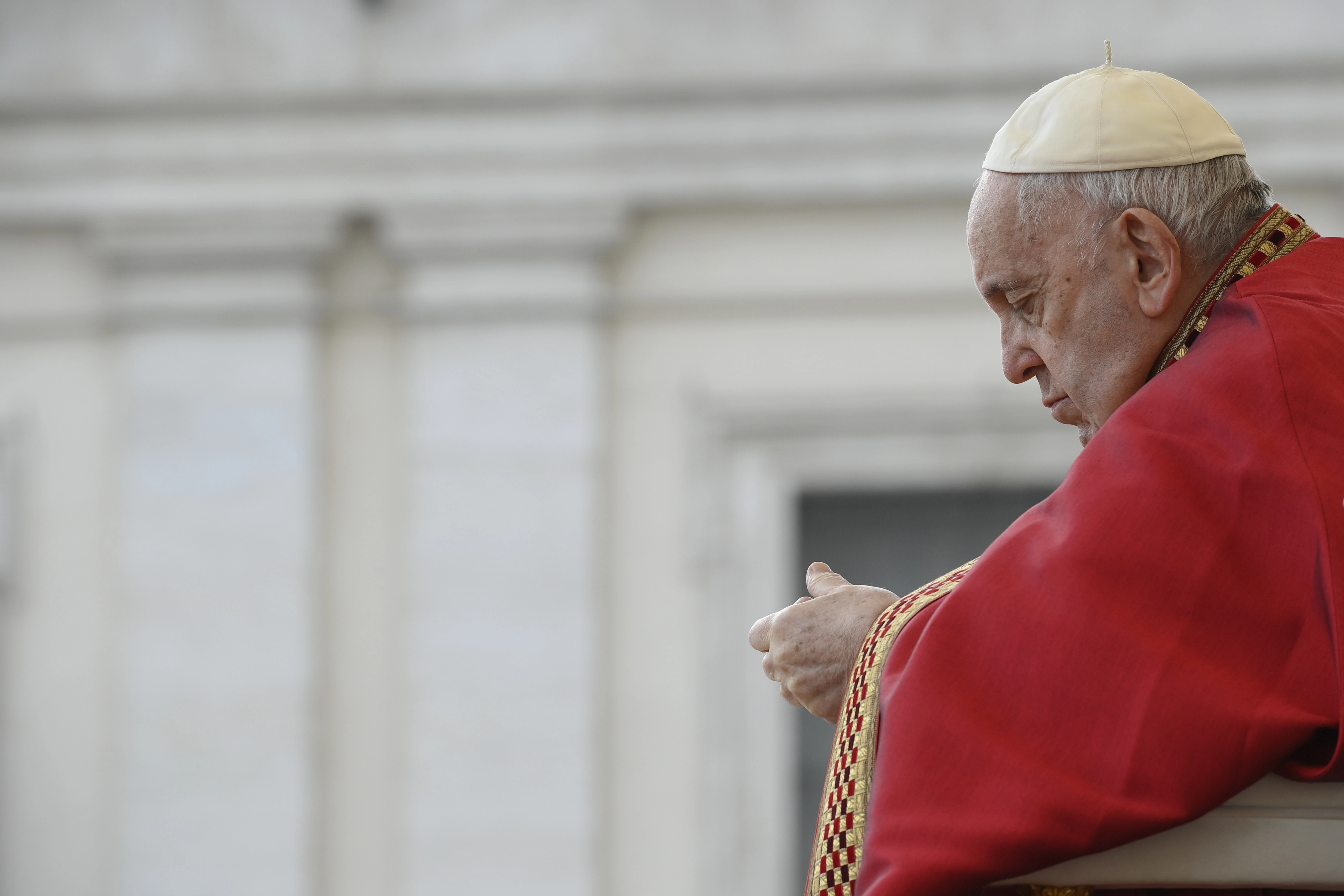The Vatican's Financial Troubles: Pope Francis' Unfinished Reform

Table of Contents
The Extent of the Vatican's Financial Problems
The Vatican's financial troubles are multifaceted and deeply rooted in its history. Understanding the scale of these issues requires acknowledging both historical practices and the impact of external economic forces.
Opaque Financial Practices
Historically, the Vatican's financial practices have lacked transparency. The complex structure of the Holy See, with its numerous departments and entities, has made oversight incredibly difficult. This opacity has, unfortunately, contributed to a lack of accountability.
- Lack of independent audits: For many years, the Vatican lacked the robust independent audits common in the private and public sectors, hindering effective financial oversight.
- Complex investment strategies: The Vatican's investment portfolio, while substantial, has involved complex strategies that have at times been difficult to track and understand.
- Difficulties tracking assets: The lack of centralized systems for tracking assets across various Vatican entities has made comprehensive financial reporting a significant challenge.
- Historical scandals involving financial mismanagement: Past scandals involving allegations of financial mismanagement have further damaged the Vatican's reputation and highlighted the need for reform.
These issues contribute significantly to the perception of a lack of financial transparency and accountability within the Vatican finances.
The Impact of Global Economic Shifts
The Vatican's financial stability has also been affected by global economic fluctuations. Its investments, like any portfolio, are subject to market risks.
- Impact of the 2008 financial crisis: The 2008 global financial crisis significantly impacted the Vatican's investments, highlighting its vulnerability to external economic shocks.
- Challenges in managing investments: Managing a diverse investment portfolio requires specialized expertise and sophisticated risk management strategies. The Vatican has faced challenges in this area.
- Reliance on donations and investments: The Vatican's finances rely heavily on donations from the faithful and the returns from its investment portfolio. Fluctuations in either can impact its overall financial health.
Understanding the interplay between opaque financial practices and the vulnerability of the Vatican economy to global financial shifts is crucial to addressing its long-term financial stability.
Pope Francis' Reform Initiatives
Since his election, Pope Francis has initiated significant reforms aimed at improving the Vatican's financial management and transparency. While progress has been made, significant challenges remain.
Key Reforms Implemented
Pope Francis has undertaken several key initiatives to modernize the Vatican's financial practices:
- Creation of the Secretariat for the Economy: The establishment of this new body was a crucial step towards centralizing financial oversight and improving coordination among different Vatican entities.
- New auditing procedures: The introduction of more rigorous auditing procedures aims to enhance financial accountability and detect potential irregularities.
- Efforts to improve financial reporting: Improvements in financial reporting are intended to provide greater transparency regarding the Vatican's finances.
- Anti-money laundering initiatives: Initiatives to combat money laundering aim to ensure that Vatican finances are not used for illicit activities.
These reforms represent a significant effort to address the Vatican's financial troubles.
Challenges and Resistance to Reform
Despite these efforts, significant challenges and resistance have hampered the implementation of reforms.
- Resistance from within the Vatican: Deep-rooted resistance from within the Vatican's bureaucracy has presented a major obstacle to reform.
- Bureaucratic hurdles: Navigating complex Vatican bureaucracy has proven to be a time-consuming and challenging process.
- Legal complexities: The legal complexities associated with reforming the Vatican's financial systems have slowed the pace of change.
- Ongoing investigations: Ongoing investigations into past financial irregularities further complicate the reform process.
Overcoming this resistance is critical for the success of Pope Francis' reform agenda.
Ongoing Challenges and Future Outlook
While Pope Francis' reforms represent a major step forward, several issues remain unresolved, requiring further attention.
Unresolved Issues
Key aspects of the reform process that still require further attention include:
- Full financial transparency: Achieving full financial transparency remains a significant challenge, requiring improved data collection and reporting.
- Improved internal controls: Strengthening internal controls is essential to prevent future financial mismanagement.
- Ongoing investigations: The conclusion of ongoing investigations is necessary to fully assess the extent of past irregularities.
- Need for external oversight: Independent external oversight could help ensure greater accountability and transparency.
Potential Solutions and Recommendations
To strengthen the Vatican's financial stability and accountability, several steps can be taken:
- Increased independent audits: Regular, independent audits are essential for ensuring the accuracy and reliability of financial reporting.
- Stricter financial regulations: Implementing stricter financial regulations would provide a stronger framework for managing Vatican finances.
- Greater transparency in investments: Greater transparency in the Vatican's investment portfolio would enhance public trust and accountability.
- Enhanced training for financial personnel: Providing enhanced training for financial personnel would equip them with the skills needed to manage the Vatican's finances effectively.
Conclusion: The Vatican's Financial Troubles: A Path Towards Transparency
The Vatican's financial troubles represent a complex issue demanding sustained attention. Pope Francis' reforms have initiated a crucial process of modernization and increased transparency, but significant challenges remain. Achieving full financial transparency and accountability requires overcoming internal resistance, implementing stricter regulations, and fostering a culture of openness and collaboration. The path toward a more financially sound and transparent Vatican is an ongoing journey, but the commitment to reform, as demonstrated by Pope Francis, offers hope for a more secure and responsible financial future for the Holy See. Stay informed about the ongoing developments in Pope Francis' reform efforts and advocate for increased transparency and accountability within the Holy See. The future of the Vatican's financial health depends on it.

Featured Posts
-
 The Long Walk Trailer Breakdown Exploring Kings Intense Dystopian World
May 08, 2025
The Long Walk Trailer Breakdown Exploring Kings Intense Dystopian World
May 08, 2025 -
 Bitcoins Price Surge Understanding The Factors Driving The Rebound
May 08, 2025
Bitcoins Price Surge Understanding The Factors Driving The Rebound
May 08, 2025 -
 Lahwr Myn Gwsht Ky Qymtwn Myn Mslsl Adafh Chkn Mtn Awr Byf Mhnge Se Mhnge Tr
May 08, 2025
Lahwr Myn Gwsht Ky Qymtwn Myn Mslsl Adafh Chkn Mtn Awr Byf Mhnge Se Mhnge Tr
May 08, 2025 -
 Dc Comics Krypto The Last Dog Of Krypton A Comprehensive Review
May 08, 2025
Dc Comics Krypto The Last Dog Of Krypton A Comprehensive Review
May 08, 2025 -
 Analyzing The Great Decoupling Trends And Forecasts
May 08, 2025
Analyzing The Great Decoupling Trends And Forecasts
May 08, 2025
Latest Posts
-
 The Colin Cowherd Jayson Tatum Debate A Comprehensive Analysis
May 08, 2025
The Colin Cowherd Jayson Tatum Debate A Comprehensive Analysis
May 08, 2025 -
 Update On Jayson Tatums Wrist Boston Celtics Head Coach Weighs In
May 08, 2025
Update On Jayson Tatums Wrist Boston Celtics Head Coach Weighs In
May 08, 2025 -
 Jayson Tatums Place In The Nba Analyzing Colin Cowherds Perspective
May 08, 2025
Jayson Tatums Place In The Nba Analyzing Colin Cowherds Perspective
May 08, 2025 -
 Jayson Tatums Wrist Injury Boston Celtics Head Coach Gives Update
May 08, 2025
Jayson Tatums Wrist Injury Boston Celtics Head Coach Gives Update
May 08, 2025 -
 Is Jayson Tatum Overlooked Colin Cowherds Take And The Ongoing Debate
May 08, 2025
Is Jayson Tatum Overlooked Colin Cowherds Take And The Ongoing Debate
May 08, 2025
